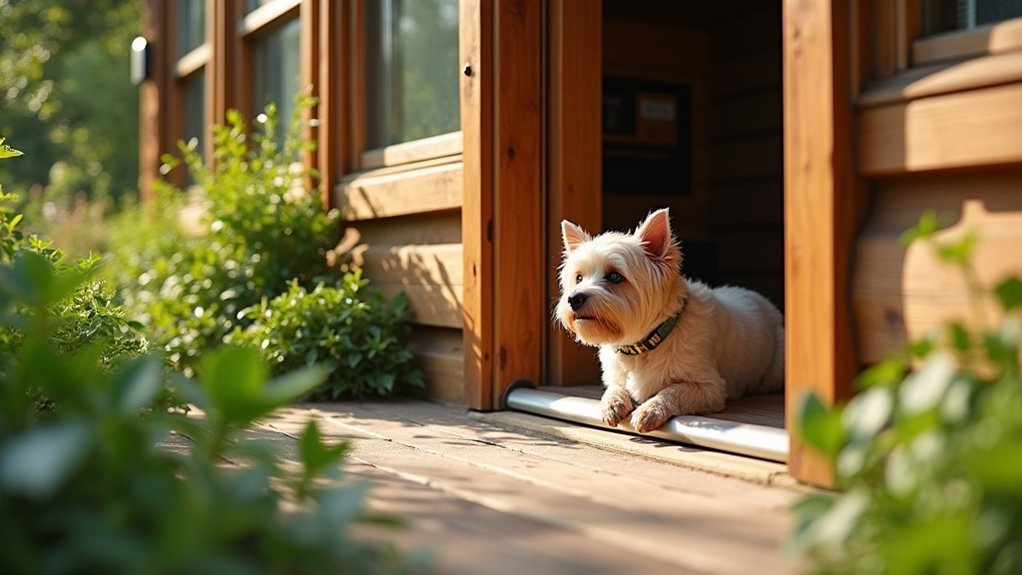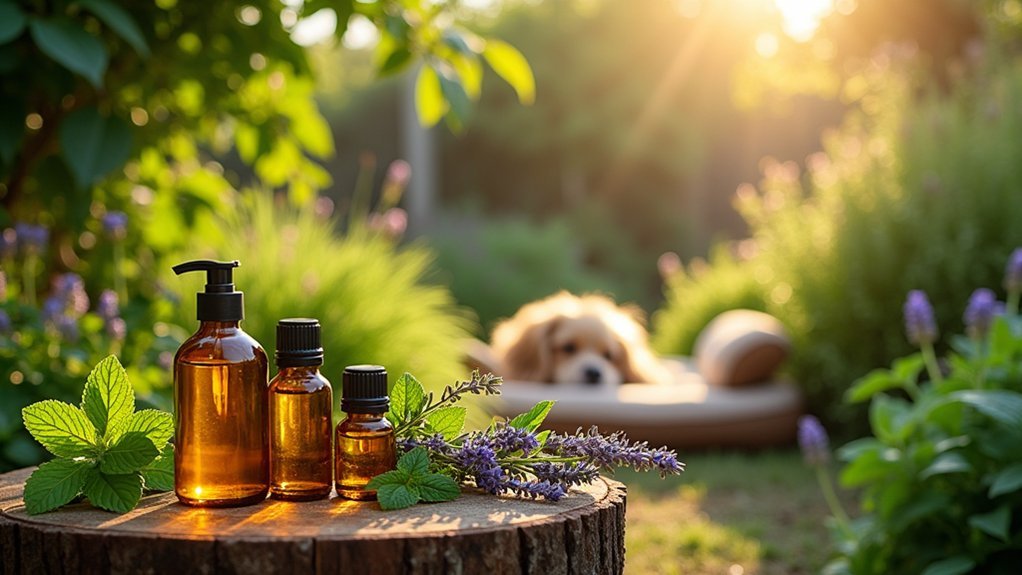To protect your pets from rodents safely, use natural repellents like peppermint or lemongrass oils around entry points. Seal gaps with steel wool and caulk, and store food in airtight containers to eliminate attractants. Keep pet food elevated and properly contained, and consider humane catch-and-release traps placed away from curious paws. Regular cleaning prevents scent trails rodents follow. These pet-friendly techniques create a thorough defense system that keeps everyone in your home safe and healthy.
Understanding the Risks of Rodent Infestations to Pets

While many homeowners focus on the annoyance of rodent invasions, these unwelcome guests pose serious threats to your beloved pets.
Rats and mice carry dangerous diseases like hantavirus, leptospirosis, and salmonella that can infect your pets through direct contact or when they investigate rodent droppings.
Beyond disease transmission, traditional Pest Control methods create additional dangers. Rodenticides that kill mice can be equally deadly if your curious pet ingests them.
You’ll also notice behavioral changes as your pets react to the sounds and smells of rodent activity, often becoming anxious or distressed.
The damage caused by rodents chewing through electrical wires and insulation creates unsafe conditions for your entire household.
Additionally, rodent presence can attract predators like snakes that may threaten your outdoor pets.
Pet-Safe Natural Repellents and Deterrents
Because traditional rodent control methods can endanger your pets, natural repellents offer a safer alternative without sacrificing effectiveness. Products containing peppermint, lemongrass, and geraniol oils create sensory barriers that rodents avoid but won’t harm your furry companions.
The 12 Pack Skunk Repellent exemplifies how plant-based ingredients can effectively deter unwanted visitors while remaining non-toxic to children, pets, and plants.
For maximum protection, apply these Natural Mouse Repellent solutions regularly around potential entry points.
Enhance your rodent exclusion strategy by combining these natural deterrents with physical barriers. Seal cracks and openings with steel wool or caulk while using essential oil-based repellents to create a thorough defense system.
This dual approach maintains a rodent-free environment without introducing harmful chemicals into your pet’s living space.
Sealing Entry Points Without Harmful Chemicals

Since effective rodent exclusion begins with blocking their access, identifying and sealing entry points represents your most powerful defense strategy. You’ll keep them away without endangering your pets by using non-toxic materials that rats can’t penetrate. Steel wool packed into gaps provides an impenetrable barrier that rodents won’t chew through.
| Entry Point | Pet-Safe Sealing Method |
|---|---|
| Windows/Doors | Silicone caulk for cracks |
| Pipe Openings | Steel wool + expanding foam |
| Foundation Gaps | Hardware cloth secured with mortar |
Regular inspection of attics, basements, and crawl spaces allows you to catch and seal new openings before rodents discover them. Combine these physical barriers with natural repellents like essential oils for maximum effectiveness. Maintaining a clutter-free environment further reduces your home’s appeal to unwanted rodent visitors.
Creating Physical Barriers That Won’t Harm Your Pets
Physical barriers form the cornerstone of a thorough pet-safe rodent exclusion strategy. When keeping mice and other rodents out of your home, focus on installing mesh screens or heavy-duty netting on vents, chimneys, and other openings. These barriers allow proper airflow while preventing unwanted visitors from entering.
Consider fortifying your outdoor spaces with strategic fencing or gates that create a protective boundary where your pets can safely play.
Inside your home, seal small gaps around windows, doors, and utility lines with caulk, while blocking larger entry points with steel wool—a material rodents can’t chew through but poses no threat to your pets.
Regular inspections of basements, attics, and garages help identify new vulnerabilities before they become problems, maintaining a thorough barrier system that protects your furry family members.
Essential Oils and Herbal Solutions for Rodent Control

Natural aromatic compounds offer an effective, pet-friendly alternative to harsh chemical repellents when battling rodent invasions.
You’ll find peppermint oil particularly powerful, as its intense scent overwhelms rats’ sensitive noses and drives them away from your home. Similarly, eucalyptus and citronella oils disrupt rodents’ navigation abilities when strategically placed near entry points.
For targeted application, soak cotton balls in these essential oils or create a homemade spray by mixing cayenne pepper with water and dish soap. Apply these solutions where you’ve noticed rodent activity.
Remember to reapply these natural deterrents regularly, as their effectiveness diminishes over time.
Proper Food Storage to Minimize Rodent Attraction
Keeping your food in sealed containers eliminates access points for hungry rodents while preventing food odors from attracting them in the first place.
Store pantry items on elevated shelves, as mice and rats prefer ground-level foraging and are less likely to climb for food that’s properly contained.
When you spill food or liquids, clean them immediately to remove the sensory trail that leads rodents straight to your kitchen.
Sealed Containers Prevent Access
An effective defense against rodent infestations begins with proper food storage. When you use sealed containers made of glass or heavy-duty plastic, you create an impenetrable barrier that prevents rodents from accessing your food supplies. This simple step considerably reduces attraction while keeping your items fresher for longer.
| Container Type | Benefits | Best For |
|---|---|---|
| Glass Jars | Completely airtight, visible contents | Grains, pasta, cookies |
| Plastic Tubs | Lightweight, durable, stackable | Pet food, flour, sugar |
| Metal Canisters | Gnaw-proof, decorative options | Coffee, tea, treats |
Don’t forget to extend this practice to pet food—store it in sealed containers too. This protects it from rodents while preventing your pets from overindulging. Regularly check and discard expired pantry items to maintain a clean environment that’s less appealing to unwanted guests.
Elevated Storage Deters Rodents
Height creates a significant advantage in your battle against rodent invaders. By placing your food storage at least 18 inches above ground level, you’re exploiting rodents’ natural tendency to forage close to the floor. This simple strategy dramatically reduces the likelihood of unwanted visitors accessing your supplies.
Install elevated shelving in your pantry and kitchen to keep edibles out of reach. Combine this approach with airtight containers to eliminate enticing aromas that might attract pests. Your elevated storage system creates a powerful deterrent that protects both human and pet food from contamination.
Don’t forget to regularly inspect and clean your elevated storage areas. Even with height on your side, crumbs and spills can accumulate and potentially attract rodents. Proper maintenance guarantees your elevated storage solution remains effective year-round.
Clean Spills Immediately
Three seconds is all it takes for a rodent to detect spilled food in your home. That’s why you must clean spills immediately after they occur, whether it’s a splash of juice or scattered crumbs from your morning toast.
Even microscopic food particles emit odors that attract mice and rats searching for their next meal. Store all food in airtight containers and keep your dining and kitchen surfaces wiped down after each use.
A thorough vacuuming helps remove hidden debris from cracks and corners where rodents typically forage.
Don’t forget to empty your garbage regularly and guarantee bins have tight-fitting lids.
When you maintain a spotless environment, particularly in food preparation areas, you’re not just maintaining cleanliness—you’re creating a powerful first line of defense against unwanted rodent visitors without endangering your pets.
Yard and Garden Management to Deter Rodents
You’ll find that eliminating food sources by removing fallen fruits and debris creates an uninviting environment for rodents seeking their next meal.
Creating strategic barrier zones with peppermint, citronella, and physical barriers like mesh fencing provides multiple layers of protection for your valuable plants.
Your plant selection matters too—opt for raised garden beds and keep vegetation well-trimmed to minimize hiding places while maximizing visibility throughout your yard.
Eliminate Food Sources
Unwanted rodents in your yard and garden are actively seeking three essentials: food, water, and shelter. Eliminating food sources is your most effective natural repellent strategy.
Clean up fallen fruits, nuts, and vegetables promptly, as these create an irresistible buffet for hungry rodents. Secure your trash bins with tight-fitting lids to prevent nighttime scavenging.
If you maintain a compost pile, use rodent-proof bins and avoid adding food scraps that might attract unwanted visitors.
Don’t forget to store birdseed and pet food in airtight containers rather than leaving them accessible. Trim overgrown vegetation and remove dense ground cover that provides hiding spots where rodents can nest while enjoying their meals.
These simple steps greatly reduce the likelihood of rodents making themselves at home in your outdoor spaces.
Create Barrier Zones
Creating strategic barrier zones provides an effective long-term approach to rodent exclusion in your outdoor spaces.
Start by planting natural rat repellent vegetation like peppermint and lemongrass around your property’s perimeter. These strong-scented plants create sensory barriers that rodents find overwhelming and avoid crossing.
Maintain your garden by regularly removing debris, cutting tall grass, and trimming overgrown plants to eliminate potential nesting sites.
Install physical barriers such as buried-edge fencing to prevent rodents from digging under and accessing your garden.
For enhanced protection, spray natural repellents containing cayenne pepper or essential oils around vulnerable areas.
Consider implementing companion planting strategies—marigolds planted alongside vegetables can confuse rodents with their potent scent.
These layered barrier techniques create an unwelcoming environment for rodents while keeping your pets safe.
Strategic Plant Selection
While many homeowners focus on traps and physical barriers, strategic plant selection offers a natural, sustainable defense against rodent invasions.
By incorporating specific plants throughout your yard, you’ll create an environment that naturally deters rodents while remaining safe for your pets.
- Aromatic perimeter defense: Plant peppermint, lemongrass, and citronella around your property’s borders—these strong scents confuse and repel rodents without harming pets.
- Decorative deterrents: Integrate marigolds and lavender into your landscaping as beautiful yet effective rodent repellents.
- Barrier plantings: Use thorny shrubs and prickly plants to create physical obstacles that discourage rodent entry.
- Habitat disruption: Develop diverse plant communities with herbs, flowers, and ground covers to prevent nesting opportunities.
These safer alternatives provide continuous protection while enhancing your garden’s appearance and fragrance.
Humane Trapping Methods Safe Around Pets
For households with both rodent issues and beloved pets, humane trapping methods offer an ideal solution that keeps everyone safe.
Catch-and-release traps allow you to capture unwanted rodents without causing harm, making them safe to use in homes where pets roam.
Humane capture methods protect curious pests without endangering your four-legged family members.
Place these traps in areas your pets can’t access while baiting them with non-toxic, pet-unappealing substances like peanut butter or birdseed. You’ll find various sizes available to match different rodent species you’re targeting.
Remember to check your traps regularly and release captured rodents far from residential areas. This consistent practice maintains humane pest control while minimizing stress for the captured animals.
These thoughtful approaches guarantee your rodent management strategy protects both wildlife and your furry family members.
Signs of Rodent Activity Every Pet Owner Should Know
As a vigilant pet owner, you’ll need to recognize rodent invasion symptoms before they become serious threats to your furry companions.
Signs of rodent activity often appear subtly at first, but quick identification can protect your pets from potential health risks.
Watch for these telltale indicators:
- Droppings – Small dark pellets near food sources or hidden corners that can be toxic if your pet investigates or ingests them.
- Unusual noises – Scratching or scurrying sounds within walls or ceilings, often causing pets to become anxious or alert.
- Gnaw marks – Visible damage on food packaging, furniture, or electrical wires that could harm curious pets.
- Pet behavior changes – Increased interest in certain areas of your home, especially cabinets or corners, suggesting they’ve detected rodents you haven’t yet noticed.
Cleaning Techniques That Eliminate Rodent Scent Trails
Once rodents establish pathways through your home, they leave behind invisible scent markers that continue attracting others even after the initial invaders are gone.
Breaking this cycle requires targeted cleaning techniques.
Mix vinegar and water to neutralize these scent trails effectively. Spray this solution in areas where rodents frequently travel. For more stubborn residues, enzymatic cleaners specifically designed for organic matter will break down urine and droppings completely.
Don’t overlook daily maintenance—sweep and vacuum regularly to remove food particles that attract rodents.
After cleaning, seal entry points with caulk or steel wool to prevent new invasions.
Finally, reduce clutter throughout your home. Excess storage provides hiding spots and makes thorough cleaning impossible. A minimalist approach helps guarantee your cleaning techniques reach every potential rodent pathway.
When to Call Professionals for Pet-Friendly Rodent Solutions
Despite your best efforts with natural methods, recurring droppings, chewed wires, or scratching sounds in walls signal it’s time to consult professional pest control experts.
Pet-friendly professionals can implement targeted exclusion techniques using tamper-resistant bait stations, ultrasonic devices, or one-way door systems that won’t harm your furry companions.
You’ll gain peace of mind knowing experts can identify hidden entry points and establish thorough protection while maintaining a safe environment for your pets.
Persistent Infestation Warning Signs
While you might try DIY methods to address rodent problems, recognizing when an infestation has become persistent is essential for protecting both your home and pets.
Even after setting traps with peanut butter and implementing preventive measures, certain warning signs indicate it’s time for professional intervention:
- Droppings continue to appear – Fresh, dark pellets near food sources or in cabinets despite your cleanup efforts.
- Recurring sounds – Consistent scratching or scurrying noises in walls, ceilings, or attics that don’t diminish.
- New gnaw marks – Ongoing damage to food packaging, furniture, or electrical wiring despite your prevention attempts.
- Pet behavior changes – Your dog or cat remains unusually alert, agitated, or fixated on certain areas of your home.
When these persistent infestation warning signs continue despite your best efforts, professional pest control becomes necessary.
Professional Treatment Options
When the warning signs of persistent infestations remain despite your diligent efforts, it’s time to bring in the experts.
Today’s pest control professionals offer specialized pet-friendly solutions designed to protect your furry family members while effectively addressing rodent problems.
Look for companies that emphasize eco-conscious treatments using non-toxic products derived from plant-based ingredients.
These specialists can conduct thorough inspections to identify entry points and hidden nesting areas that you might’ve missed.
Many implement integrated pest management strategies that safely control rodent populations without endangering household pets.
Consider professionals who utilize advanced technologies like ultrasonic repellents or exclusion techniques.
Always verify that your chosen service is licensed and has specific experience implementing pet-safe rodent solutions—your pets’ safety should never be compromised during treatment.
Frequently Asked Questions
What Kills Mice Without Harming Pets?
You’ll find pet-safe mouse elimination options like MouseX and RatX that use natural ingredients. These products disrupt rodents’ digestive systems while remaining harmless to pets, unlike traditional poisons containing anticoagulants.
What Is the Best Natural Rodent Repellent?
Peppermint, lemongrass, and cedarwood essential oils are your best natural rodent repellents. Try EPA-registered products like Fresh Cab or EcoClear’s MouseX®. You’ll need to reapply them every four weeks for continued effectiveness.
What Smell Do Rodents Hate the Most?
Rodents hate peppermint oil most intensely. You’ll find it effectively disrupts their sense of smell. They’re also strongly repelled by citronella, cayenne pepper, and cedarwood, especially when you combine these scents for maximum effect.
Do Rodent Exclusions Work?
Yes, rodent exclusions work effectively when implemented properly. You’ll see the best results by combining physical barriers like steel wool with natural repellents such as peppermint oil, and maintaining these deterrents consistently over time.
In Summary
You’ve now got everything you need to protect your pets while keeping rodents at bay naturally. Remember, it’s all about prevention—seal entry points, use pet-safe repellents, and establish barriers that keep unwanted guests out. Stay vigilant for signs of rodent activity and don’t hesitate to call professionals when needed. With these strategies, you’ll create a safer, healthier home for your entire family.





Leave a Reply